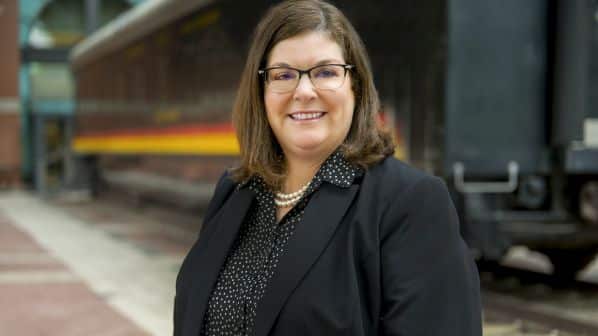Lindsay Day, director of capital markets, Greenbrier, United States
LINDSAY Day carries out critical revenue-generating activities at Greenbrier on its wagon syndication team, part of the company’s rolling stock leasing operations.
Day entered the industry with no prior rail experience but immediately proved an adept and capable learner, who is able to retain and apply new information at a fast pace, according to her nominator. In her five years with Greenbrier she has developed her role from that of an individual contributor to a management position. Day carries out her role against strict deadlines, often involving last-minute, high-level negotiations, and her position requires a unique mix of legal work, financial expertise, negotiation and customer service skills, and extreme attention to detail.
When she first joined the team, a major project Day took on was creating a formal database to ensure that Greenbrier could closely monitor and track all the various components of transactions, often consisting of considerable sums, from closing dates to customer-specific preferences. Using the system she has developed, Day can now closely monitor each deal from initiation through to wire transfer of payment. This has significantly enhanced Greenbrier’s relationship with its customer base of investors, and the database has since expanded into other departments, ensuring consistency.
Day interacts with all sectors of the business, and in addition to working directly with Greenbrier’s executive leadership, she has excellent customer service skills, including with financial investors and operating lessors.

CPKC, Canada
Day’s community service involvement has seen her acting as liaison officer between Greenbrier and the University of Oregon Law Programme, where she administers scholarships from Greenbrier to the Oregon Law Students Public Interest Fund (OLSPIF). OLSPIF funds stipends for living expenses allowing law students to work during their summer vacations in unpaid public-interest positions at legal non-profit organisations that serve under-represented people and causes.
Colleagues say that Day is an inspirational figure for many women at Greenbrier due to her positive attitude and exceptional work ethic. She regularly mentors new staff and provides guidance and peer support. She has also led sessions with Greenbrier’s Women’s Leadership Resource Group and offers her services to all colleagues in need of guidance.
When Greenbrier introduced Employee Resource Groups (ERGs) in 2022, Day was among the first to take on a leadership position and currently manages the Emerging Leaders ERG, where she facilities training opportunities for those who are more recent recruits to the company.
Choo Chai Foong, group director, infrastructure design and engineering, Land Transport Authority, Singapore
SINGAPORE’s metro network is the infrastructure backbone of the island country. Since the first line opened in 1987, the network has steadily expanded to 231km, and with several lines under construction it is on course to reach 360km by the early 2030s. In her 26-year career with LTA, Chai Foong has played a key role in this rapid expansion.
Over the past 20 years, she has been involved with the design development of the 36km Circle Line, the 42km Downtown Line, the 30km Thomson-East Coast Line, and the 50km Cross-Island Line, currently under construction. As group director for engineering, Chai Foong leads a diverse team of more than 400 civil engineers, architects and land surveyors to develop designs for all land transport infrastructure in Singapore and has been responsible for the design of civil works, including stations and tunnels, trackwork and permanent way for each of these metro projects.
Among the more recent projects that Chai Foong has overseen is the four-in-one depot project, which comprises combining three rail and one bus depot into a single multi-storey facility. This project has saved 44ha of land and produced a $S 2bn ($US 1.49bn) cost saving. She has also worked on developing the design for the first single large diameter tunnels in Singapore, which are being built for the Cross Island Line, as well as overseeing the introduction of Building Information Modelling (BIM) within the construction sector in Singapore.

The designs for these projects are produced by a large number of engineering and architectural consultants, both domestic and international, and as Chai Foong’s nominator states, she has demonstrated the technical leadership necessary to manage and oversee this design process effectively. This includes making difficult decisions to reject designs on technical grounds, while maintaining the respect of the industry and her peers.
A key area of her team’s work is to obtain approvals for infrastructure planning and design from other regulatory authorities in Singapore, as well as interacting during stakeholder engagement sessions. This includes with community and interest groups such as heritage and environmental societies. Chai Foong’s nominator writes that she has shown good leadership by empowering her team to take on innovative design solutions and push the boundaries of infrastructure design, while taking the lead when facing difficulties with securing challenging agreements and approvals. “She is very supportive of her staff’s careers and professional development, and regularly shows care and concern for their wellbeing,” they write.
Her nominator adds that one of Chai Foong’s key strengths is her ability to join up all of the dots necessary to effectively plan new railway infrastructure. The complex interactions require her to display innovative thinking to optimise solutions and evaluate the trade-offs necessary to deliver effective infrastructure design. For example, in developing the design for the four-in-one depot project, she had to consider the security and operations and maintenance requirements of each of the Downtown, Thomson-East Coast, and East-West lines for this major facility. She also had to steer her team to overcome the engineering challenges of preparing the brownfield site for new construction.
Chai Foong’s ability to work at the cutting edge and the very top of what is often a male-dominated industry is testament to her skills and leadership qualities. That she has done it for 26 years is all the more remarkable.
The importance of offering inspiration to others is not lost on her and she regularly gives talks to encourage women to enter the construction industry. She was a keynote speaker at a seminar organised by the Singapore Association of Women in Construction in 2022 and also sits on an advisory committee for the Nanyang Technological University School of Civil and Environmental Engineering. Certainly, young people can do much worse than to follow Chai Foong’s example as they pursue their own careers in construction.
Sujatha Narayan, senior vice-president and India region leader, Wabtec
SUJATHA Narayan has been instrumental in positioning Wabtec to support India’s dynamic rail industry, where wholescale modernisation of the Indian Railways (IR) rolling stock fleet is now underway alongside a major resignalling programme and working towards the goal to achieve 100% electrification of the IR network.
Narayan leads Wabtec in India, where it is one of largest suppliers of railway equipment, with 3000 employees and annual revenue of $US 500m. Narayan joined the company in August 2017 as managing director of the transit business. At that time, Wabtec was one of only two suppliers able to supply braking equipment for LHB coaches and electric locomotives that met IR’s requirements. Under Narayan’s leadership, IR production requirements were met within six months, with an on-time delivery rate of over 95% and a customer satisfaction score of 79.

Narayan is now helping to lead the project to build 1000 Evolution Series diesel locomotives for IR under a public-private partnership. A total of 500 locomotives have been delivered on schedule, and the two maintenance facilities set up by Wabtec are now delivering fleet availability above 95%.
One of the facilities is staffed by IR personnel, Wabtec being the first private company to successfully implement this arrangement which has encouraged IR to divest other rolling stock manufacturing and maintenance facilities to OEMs from the private sector. Narayan has also been responsible for establishing the Wabtec India Technology and Engineering Centre in Bangalore, the largest railway engineering centre in India and the single largest engineering centre set up by Wabtec. Working with colleagues in Australia and the US, the Wabtec team was able to secure the first order for internet-based condition-monitoring systems in the Indian mainline market, a major contract with IR to supply 97 systems worth $US 50m.
Having quadrupled revenue at the transit business between 2017 and 2022, and having played a key role in the successful merger in 2019 of the Wabtec, Faiveley and GE Transportation operations in India, Narayan is now implementing the strategic plan that she instigated to increase Wabtec revenue in India to $US 1bn by 2025. In a country where diversity in the rail industry is low, she is highly respected by customers, suppliers and employees alike, and as one of a small handful of female industry leaders she is an inspiration to women across India.
Wanda Comer, managing director of railroad operations solutions, CPKC, Canada
THE delivery of Positive Train Control (PTC), a new interoperable signalling system, across the entire United States’ railway network has inevitably constituted a major undertaking. Each railway was responsible for equipping its own network. For Kansas City Southern (KCS), this specifically meant rolling out PTC on 3466 route-km or 78% of its network in the US as well as 76% of its US locomotive fleet, investing $US 300m.
Playing a key role in this project was Wanda Comer. As her nominator writes, when KCS began PTC implementation, there were many unknowns. The technology was new, the federally-mandated deadline short, and a team was not initially in place to tackle the project. Step forward Comer, who was recruited to lead and build an IT team with the many skillsets required to successfully implement PTC.
Comer had been out of the railway industry for more than 15 years before joining KCS in 2015. She had previously spent a year at Union Pacific (UP) earlier in her career. Other roles included positions in telecommunications, e-commerce, customer service and sales, and she gained significant experience of leading global projects. Comer is described as a specialist in organising and implementing complex systems, integrating programmes, solving complex business issues, developing sustainable processes, and most importantly, coaching staff to achieve their best.

CPKC, Canada
Upon joining KCS, Comer had to relearn railway operations as well as quickly get to grips with PTC. She soon found that there was no manual for the new system, so she built it from the ground up. Comer brought in several IT experts and used her skills as a seasoned IT leader to structure the new team around a common goal. The team soon implemented customised templates for resource management, project tracking, and financial management that kept it moving towards delivery.
In addition, Comer created an industry customer user group for Wabtec, a key PTC supplier and one for which all the Class 1 railways were vying for attention and development time. To promote teamwork and collaboration, Comer created and led user groups that included participants from many railways working on PTC, helping to smooth the transition to the new technology.
Ultimately, her work proved crucial for KCS’ ability to implement the system ahead of the federal deadline - and in just 24 months - with KCS the second railway to complete its PTC programme.
Comer’s skills have also proven invaluable in the past two years as KCS has worked with Canadian Pacific (CP) to merge the two railways and create CPKC in what has been described as “the deal of the century.”
She has led the legacy KCS railway operations IT team during this process, including transport, mechanical, engineering, health, safety and environment (HSE), crew and intermodal operations. Importantly, she drew on her experience of three significant mergers during her time in the telecommunications sector, each of which brought their own set of challenges.
Indeed, her nominee reports how Comer identified common patterns from these experiences, which help to guide leadership of her team. Her key contribution was helping engineers to persevere and overcome challenges during a period of uncertainty. She specifically coached people to have increased patience and flexibility, and by leading with curiosity, fostered both a creative and trustful environment during merger planning. This was furthered by an open-door policy that encouraged employees to share both good and bad experiences, which is credited for helping to keep her team on target and to continue to create opportunities. Ultimately, she proved a key player in helping to complete the Day 1 CPKC Integrated Operating Plan and to deliver capital projects to support the merged railway’s business, regulatory, and safety requirements.
It is early days for CPKC. But with Comer among its ranks, the railway is certainly much better off as it pursues the growth and development that the merger is expected to deliver.
Part 1 of Women in Rail 2023 can be found here
Part 3 of Women in Rail 2023 can be found here
Part 4 of Women in Rail 2023 can be found here

